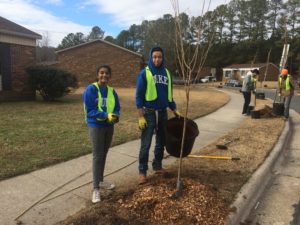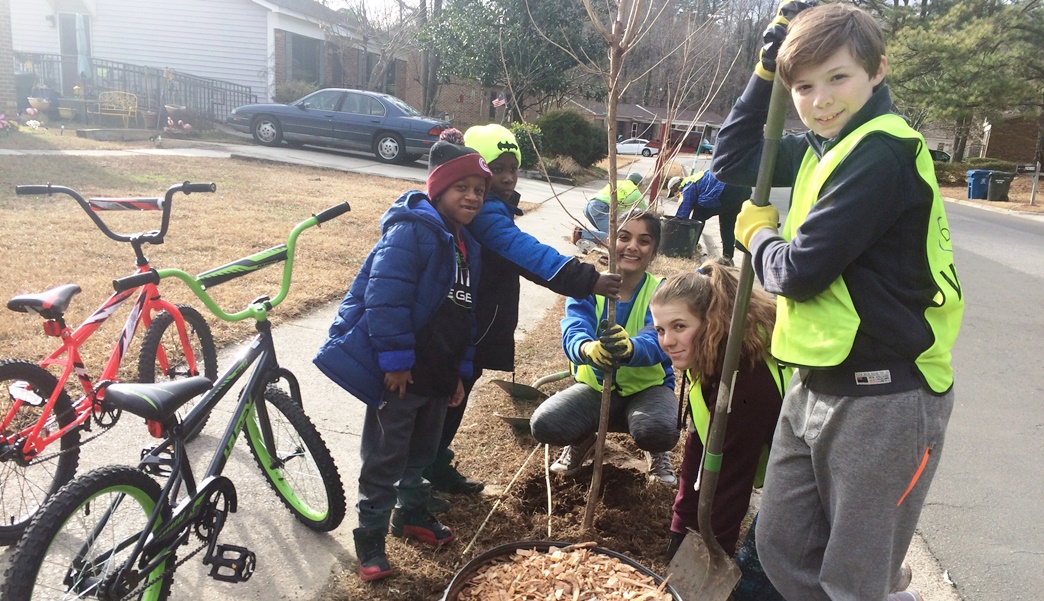Adding trees to urban areas not only means more shade coverage and wildlife habitat, but also improved air quality, noise levels and storm-water control. But cities and nonprofits often struggle to fund such urban reforestation.
In Greensboro, North Carolina, a company called Urban Offsets is helping corporations and higher education institutions invest their carbon offsets in a way that helps the places they care about become healthier, more beautiful, and more resilient.
This transforms carbon offsets into assets that help fight climate change, strengthen strategic partnerships, and create climate resilient cities.
In 2007, Duke University signed the American College and University Presidents’ Climate Commitment (ACUPCC) and set a target of achieving climate neutrality by 2024. After aggressively reducing emissions on campus, Duke will still have to offset an estimated 185,000 metric tons per year of carbon dioxide equivalent in 2024.
 Now, in early 2018, Delta Air Lines (the official airline of Duke Athletics) and Duke University have expanded their partnership, creating a first-of-its-kind program. Facilitated by Urban Offsets, the program uses carbon credits to help revitalize struggling neighborhoods in Duke University’s home town of Durham, North Carolina, and neighboring Raleigh.
Now, in early 2018, Delta Air Lines (the official airline of Duke Athletics) and Duke University have expanded their partnership, creating a first-of-its-kind program. Facilitated by Urban Offsets, the program uses carbon credits to help revitalize struggling neighborhoods in Duke University’s home town of Durham, North Carolina, and neighboring Raleigh.
Delta and Duke’s combined purchase of 5,000 carbon credits, simultaneously offsets carbon from all Duke University business travel on Delta in 2017, while supporting urban forestry in the Raleigh-Durham area through funding the planting and care of 1,000 new trees. A single carbon offset is equal to one metric ton of CO2 being removed from the air, while the 1,000 trees being planted locally will generate the removal of an additional 5,000 metric tons of CO2 from the air during their lifespan – together, that’s like neutralizing the carbon footprint of around 9,000 roundtrip flights between Atlanta and Los Angeles.
“Duke’s passion for offsetting their travel with Delta is multiplied by their commitment to use the offsets to improve certain Raleigh-Durham neighborhoods where tree canopies have all but disappeared,” said Tim Mapes, Delta’s Chief Marketing Officer. “Projects that build pride in local communities and expand our global sustainability efforts are what being part of a community is all about.”
Approximately half of the trees being planted will benefit historically disadvantaged Raleigh-Durham neighborhoods identified through a 2016 Duke Nicholas School of the Environment student-led report outlining the red-lining policies of the 1930s that resulted in trees being planted in mostly wealthy white neighborhoods.
Delta was the first U.S. airline to offer carbon offsets to customers and is the only airline to cap greenhouse gas emissions at 2012 levels by purchasing carbon offsets – more than 2.5 million in 2017 alone, and more than $8 million-worth since it started the voluntary effort.
This new program builds on the global airline’s efforts to continue the carbon-neutral growth it has maintained since 2012, and builds on its industry-leading program that encourages customers to use the carbon calculator at delta.com/co2 to estimate their carbon emissions associated with trips and invest in carbon offset projects of their choice.
 “This is a great example of the type of carbon offset project we’re interested in,” said Tallman Trask, Executive Vice President of Duke University. “Rather than seeking out the cheapest available carbon credits, we’re continuing to invest in projects with multiple benefits for our community in North Carolina. We’re happy for the opportunity to partner with Delta Air Lines and Urban Offsets to further catalyze this market.”
“This is a great example of the type of carbon offset project we’re interested in,” said Tallman Trask, Executive Vice President of Duke University. “Rather than seeking out the cheapest available carbon credits, we’re continuing to invest in projects with multiple benefits for our community in North Carolina. We’re happy for the opportunity to partner with Delta Air Lines and Urban Offsets to further catalyze this market.”
The Duke Carbon Offsets Initiative (DCOI) was created as a branch of Sustainable Duke to help Duke University achieve its climate neutrality goals. Since its beginning in 2009, it has developed a variety of innovative carbon offset programs including swine waste-to-energy, energy efficiency, solar energy, and urban forestry. The DCOI also acts as an academic offset project hub, collaborating with higher education institutions on joint projects and connecting other universities to the resources required for successful carbon offset projects.
Using a Sustainability Portfolio approach, Urban Offsets evaluates and grades carbon offsets and bundles them with community development programs that sustainably engage nonprofit partners in each city. Urban Offsets currently operates in 12 U.S. markets and supports more than 10,000 new trees planted in 2017.
Their innovative carbon offsets program directly addresses that funding gap, helping to ensure every new urban tree can be cared for while it grows, and providing local volunteering opportunities for Duke University faculty, students and staff, as well as Delta employees.
“This model unites the sustainability goals of multiple organizations,” said Shawn Gagné, CEO and founder of Urban Offsets. “Cooperation is the key to addressing sustainability challenges, and Delta and Duke are true champions in this regard.”

